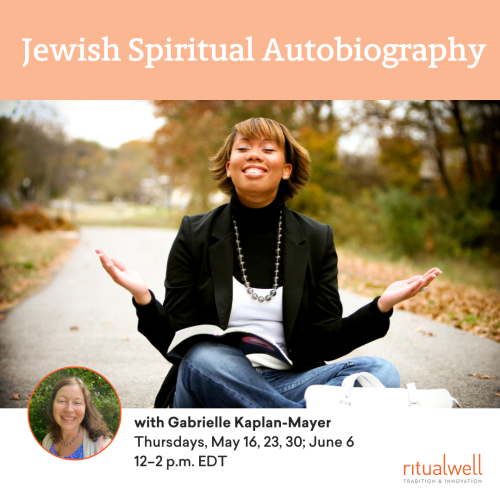Nearly a year ago I completed my first observance of shloshimLit. Thirty The first thirty days after someone dies. This is an intermediate stage of mourning -- less intense than then initial week of shiva, but more intense than the remainder of the first year. It is customary not to shave or cut one's hair and not to attend social gatherings, parties, concerts etc during this time. after the death of my mother. During this month I grew a full beard, in part to have a way of marking the passage of time during my aveilut. As shloshim’s conclusion approached, I found myself wondering how I might deepen the experience with ritual. A quick search and survey produced no helpful traditional practices. When I went to shave, only the barest hints of this ceremony had revealed themselves. In the moment I paused and focused myself in that moment, and then sought to appreciate the visage that stared at me from my mirror. I recall that my face looked even furrier than it felt. I thought about the ancient motif connecting hair and power found in the Bible and other cultures, and expressed so powerfully by Robert Bly in Iron John. I reflected on the wildness that death brings when it visits our homes and our lives. As I looked at my transformed face, I asked myself how my perspective on my mother might have changed during the past thirty days. The shaving itself was an opportunity to preserve a sign of change by not automatically going back to my “standard” styling. I decided to grow my sideburns down to my cheekbones, instead of the bottom of my ear. Finally, I asked myself what lessons from my new appreciation of my mother and myself could I apply to good effect in my life.
Over the past year I have let the rest of this ceremony reveal itself to me. The outline of the ritual follows. Under each heading I offer texts for generating your own thoughts, and/or an approach or explanation for a particular element that can guide you in how you approach this occasion.
May you find the blessing of comfort among all who mourn loss.–Rabbi David Greenspoon
Outline and Perush / explanation
KavannahLit. Intention Refers both to one’s intention when performing a mitzvah or when focusing for prayer. Kavanah also refers to specific readings to help focus one's attention prior to performing an act.
Before the shaving I was already beginning a to craft formal kavannah. What follows is a formalized expansion of my brief moment of focus:
Here I am. Prepared. Ready. I take this opportunity to mark the end of my shloshim for my mother, my teacher Yehudit bat Mordechai v’EstherHeroine of the Purim story and Megillat (the scroll of) Esther. She is married to the king by her cousin Mordecai and ultimately saves her people from execution.. I look at my face and see it transformed through this time of loss and I know that my life is transformed through this loss. Just as I tame the wildness of this hair, so too may I tame the wildness that death’s visit has brought.
Question of Reflection #1:
What have I learned about my mother and myself during this time?
Pasuq/verse
Some might find it unseemly to recite a verse in a bathroom, in which case they should avoid reciting it, or use a different sink for shaving.
One practice might use the tradition of connecting a name to a verse. There are many resources available to help you find verses associated with particular names.
Another option is to recite verses connected to the Hebrew word for beard, זקן.
Yet another option is to find verses that offer you a sense of comfort, meaning, or with which you otherwise feel a special connection.
Birkat haTov v’haMetiv: Blessed is the One Who is Good and Does Good
The most widely form of the blessing is in Birkat HaMazonGrace after meal: traditional versions include four blessings for the food, the land, Jerusalem and God's goodness. There also are many abbreviated or alternative versions., and it is usually appreciated as a blessing for God’s bounty which is enjoyed in company. The TalmudThe rabbinic compendium of lore and legend composed between 200 and 500 CE. Study of the Talmud is the focus of rabbinic scholarship. The Talmud has two versions, the main Babylonian version (Bavli) and the smaller Jerusalem version (Yerushalmi). It is written in Rabbinic Hebrew and Aramaic. (Pes. 50a) asserts that in Olam HaBah this is the blessing that replaces the statement “Baruch dayan ha-emet” usually recited upon hearing the bad news of someone’s death. In the World that is Coming we will recite Hatov Vehametiv on both. We are never closer to that world while in this one than when we live in that liminal space and time with life and death intertwined. At the very least, many of us will have experienced touching expressions of kindness in the wake of our loss, and we can thank God for them even as we write acknowledgement notes.
Shaving
Consider a change of facial hairstyle, e.g. retaining a moustache, lengthening/shortening sideburns, etc.
Birkat Ishi
This moment lends itself to alternative formulations of the standard brakhahA blessing, completed by a personal statement. I found this meaningful:
בְּרוּכָה אַתְּ רָחְמָנַה עַל הַחֶסֶד מִקְּהִלָּתִי וְעַל הָאַהֲבָה מִמִּשְׁפַּחְתִּי
Brukhah at Rahmana, al hahesed m’kehilati, v’al ha-ahavah m’mishpahti.
Blessed are you the comforter, because of the compassion from my community and because of the love from my family.
Pasuq
This can either mirror or complement your prior verse choice.
Question of Reflection #2
How do I apply what I have learned from these thirty days into the rest of my life?
Kavannah
Holy One: I mark now the end of the shloshim for my mother Yehudit bat Esther v’Mordechai. Her death changes my family and my life. May the lessons I have learned in this time be with me in a life lived with meaning. May I continue to recall her love throughout my life, feel her presence and uplift from inspiring memories.











